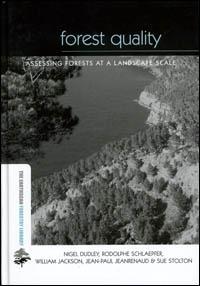Forest quality : assessing forests at a landscape scale

Publisher:
Organization(s):
In this groundbreaking text, forest quality is discussed as a useful new concept in forest conservation and management. Three main assessment criteria are used: authenticity, environmental benefits, and social and economic benefits. A methodology and protocol for collecting and analysing data is described, and the approach needed with each indicator is outlined in detail. A landscape approach to assessment is advocated, as meeting conservation goals also means addressing human needs, and balancing the trade-offs involved is only possible at a landscape scale. Assessment is demonstrated in a series of case studies from Europe, Africa, Asia and Latin America, showing how this method can be used in many ways to help forest conservation management.
Monographic Series:
Includes bibliographic references and an index
Broad subject:
Call number:
Record updated: 2023/07/05
